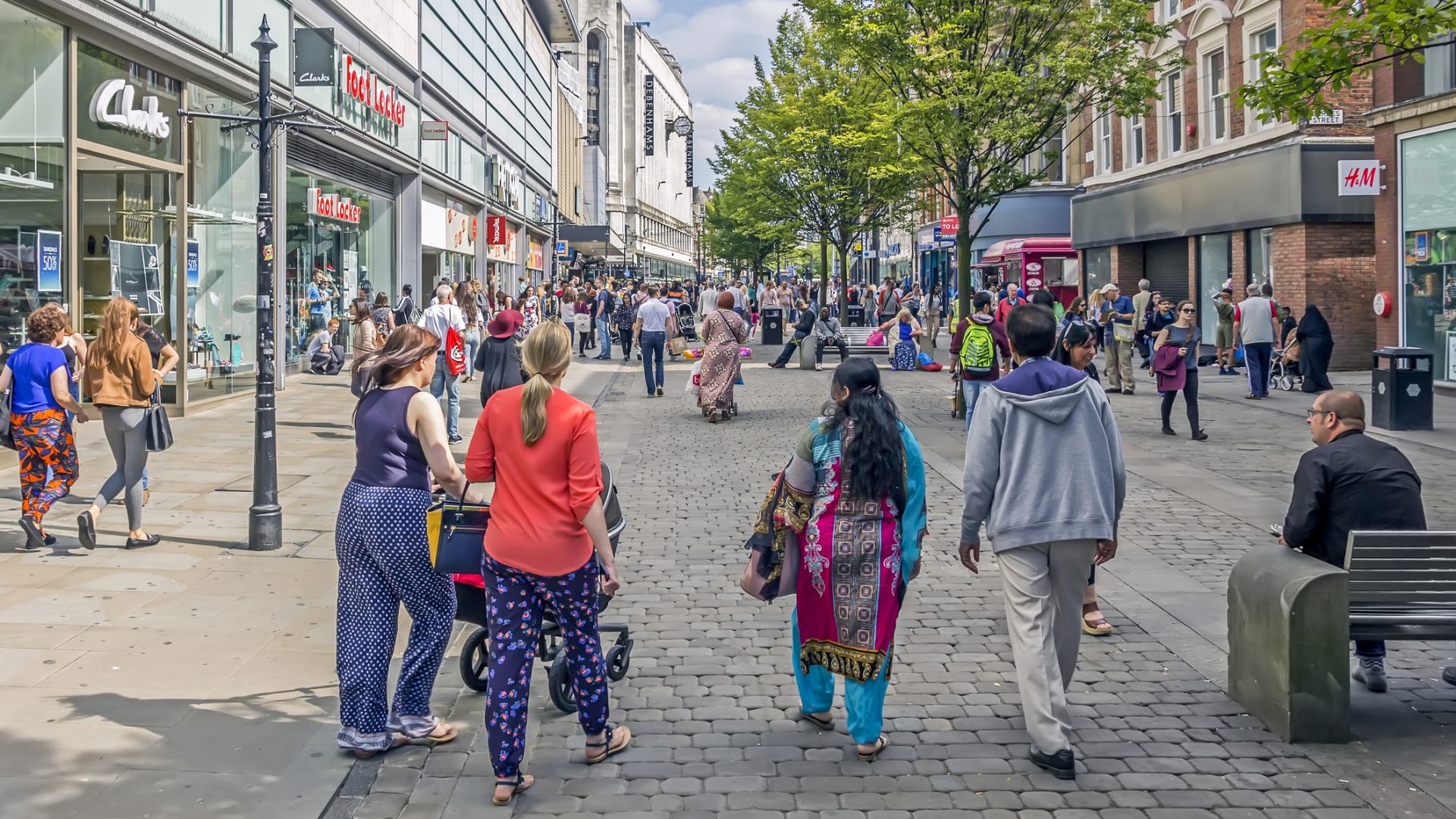

Now in its third year, Life in the UK is beginning to tell a slightly longer-term story of what life is like for people who live in England. Despite some limited progress, in 2025, the wellbeing of people in England is largely stagnant, and continues to be determined by the circumstances in which they live.
- Democracy
- Economy
- Environment
- Evidence and reports
- Inequality
- Measuring wellbeing
- Society
- Carnegie UK
- 9 November 2025
- ISBN: 9978-1-917536-06-6
- 15 minute read
Collective wellbeing in England 2025
Out of a possible score of 100, the collective wellbeing score of people in England in 2025 was 62. This has shown no statistically significant change over time since we began the index three years ago.
However, there has been a statistically significant change in England’s democratic wellbeing score, which has increased by one point from 41 to 42 since 2024. While this is still alarmingly low, it shows that change is possible. People’s social, economic, and environmental wellbeing have neither improved nor worsened over the past three years.
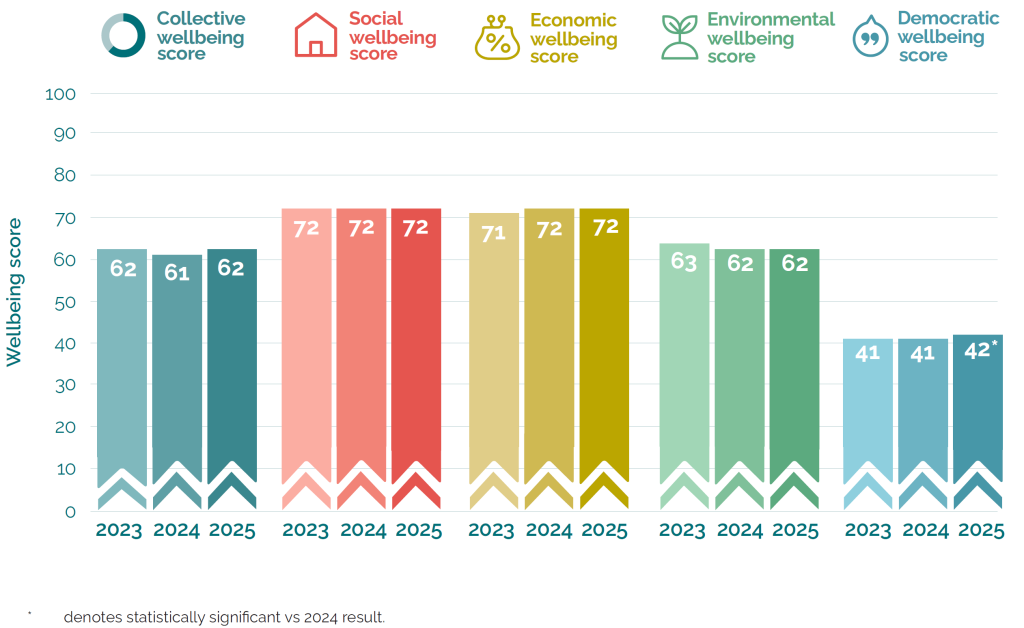
Understanding what influences collective wellbeing
Although England’s overarching collective wellbeing score has not changed over time, and three of the four domain scores also remain unchanged, there have been changes in some other aspects. This includes the improvement to democratic wellbeing and to some of the factors that contribute to overall wellbeing. These changes show that collective wellbeing continues to be affected by a wide range of factors, many of which are not in any one individual’s or entity’s power to control or change.
The index tells us that people’s experience of life in England varies substantially according to their circumstances, highlighting the reality of inequality between people and within communities across the country.
In 2025 the following three factors stand out as particularly significant in predicting a lower or higher collective wellbeing score. These were also particulary significant in 2024:
- The higher the household income, the higher the collective wellbeing score: People who have a household income of over £100,000 per year have a collective wellbeing score of 68. This is 12 points higher than for those with a household income of below £26,000 per year.
- As the level of area deprivation worsens, collective wellbeing decreases: People who live in the least deprived areas (IMD5) have a collective wellbeing score of 67, 12 points higher than for those in the most deprived areas (IMD1).
- Being disabled is strongly associated with lower collective wellbeing: Disabled people have a collective wellbeing score of 55, nine points lower than for those who are not disabled.
The following are also notable influences on people’s collective wellbeing:
Age: People over the age of 55 have a collective wellbeing score of 66. This is seven points higher than for those aged 16 to 34. Those aged 35 to 54 have a collective wellbeing score of 60.
Number of children in the household: Those with three or more children under the age of 15 in the household have a collective wellbeing score of 55. This is eight points lower than for those with no children.
Housing tenure: People who live in social housing have a collective wellbeing score of 52. Those who rent from a private landlord have a collective wellbeing score of 56, while homeowners have a score of 65.
Urbanity: People in urban areas have a collective wellbeing score of 61. This is six points lower than those who live in rural areas.
Ethnicity: Ethnic minorities (including White minorities) have a collective wellbeing score of 57. This is six points lower than for those of White British ethnicity.
Gender: Men have a collective wellbeing score of 63. This is two points higher than for women.
Collective wellbeing map
Social wellbeing is about everyone being able to achieve their potential and contribute to society because they have their basic needs met. Our basic needs include having access to health and social care, education, housing, transport, digital resources and childcare.
To determine trends in social wellbeing, we asked questions about access to public services, community relationships, safety and community cohesion, and self-reported health and mental health.
The people most likely to experience high levels of social wellbeing in England in 2025 are:
- People who have a household income of over £100,000, who have a social wellbeing score of 78. This is 11 points higher than for those earning up to £26,000.
- People who live in the least deprived areas, who have a social wellbeing score of 77. This is 11 points higher than for those who live in the most deprived areas.
- People over the age of 55, who have a social wellbeing score of 76. This is seven points higher than for those aged 16 to 34.
- Men, who have a social wellbeing score of 74. This is three points higher than for women.
In contrast, the people who are likely to experience low levels of social wellbeing in England in 2025 are:
- Disabled people, who have a social wellbeing score of 62. This is 14 points lower than for those without a disability.
- People who live in social housing, who have a social wellbeing score of 63. This is 12 points lower than for people who own their own home. Those who rent from a private landlord have a social wellbeing score of 67.
- People from an ethnic minority group (including White minorities), who have a social wellbeing score of 67. This is six points lower than for those of White British ethnicity.
- People who live in an urban area, who have a social wellbeing score of 71. This is five points lower than for those who live in rural areas.
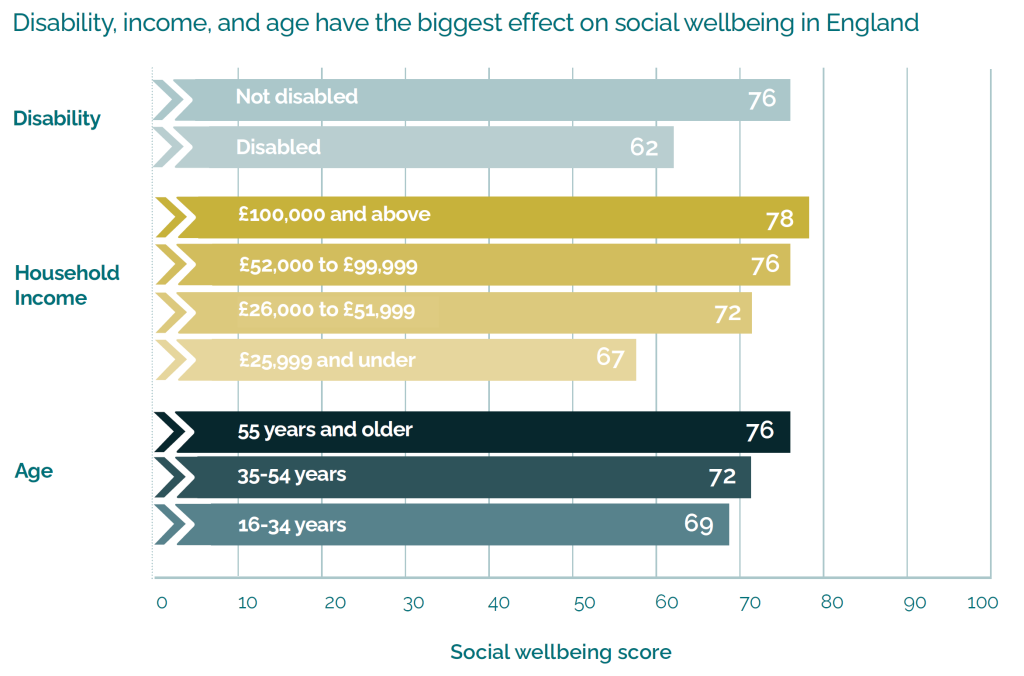
Social wellbeing – standout statistics
While some health measures, albeit not mental health, have improved, other indicators of social wellbeing are stagnant or have worsened.
- 68% of people say they are in good general health, three percentage points higher than in 2023, while 35% of people say that it is easy to get a GP appointment at a time they need one, six percentage points higher than in 2023.
- 65% of people feel that they could rely on someone in their neighbourhood if they were alone and needed help. This is the same as in previous years but is significantly lower than in the other UK jurisdictions.
- 44% of people report they have been unfairly treated or discriminated against in the last 12 months, three percentage points higher than in 2023.
Social wellbeing summary
The social wellbeing of people in England remains 72 out of 100. This score has not changed since Life in the UK first reported in 2023. However, there has been some movement within certain aspects. Over time, self-reported general health has improved slightly, and people in England are now more likely to say that they find it easy to get a GP appointment when they need one.
The data continues to reveal deep and persistent inequalities. Disabled people, those on low incomes and younger people consistently report lower levels of social wellbeing. It is also particularly concerning that the number of people in England reporting that they have been treated unfairly or discriminated against remains high and is increasing.
Carnegie UK believes that everyone should have what they need to live well together. This includes health, fair treatment, and access to the services we all need, which are the building blocks of better wellbeing. The persistent gaps in social wellbeing show that, currently, not everyone has what they need.
Economic wellbeing in England 2025
England scores 72 out of a possible 100 for economic wellbeing.
Economic wellbeing means that everyone has a decent minimum living standard and can absorb financial shocks. This includes access to a decent income, affordability, financial resilience, job opportunities and skills.
To determine trends in economic wellbeing, we asked questions about skills and job availability, and the affordability of essential items like food and fuel.
The people most likely to experience high economic wellbeing in England in 2025 are:
- People with a household income of more than £100,000 per year, who have an economic wellbeing score of 84. This is 25 points higher than for those with a household income of less than £26,000 per year. Those with a household income of between £52,000 and £99,999 have an economic wellbeing score of 79, and those with a household income of between £26,000 and £51,999 have an economic wellbeing score of 71.
- People who live in the least deprived areas, who have an economic wellbeing score of 78. This is 15 points higher than for those who live in the most deprived areas.
- People over the age of 55, who have an economic wellbeing score of 76. This is seven points higher than for people aged 16 to 34.
- Men, who have an economic wellbeing score of 73. This is two points higher than for women.
In contrast, the people who are likely to experience low economic wellbeing in England in 2025 are:
- People who live in social housing, who have an economic wellbeing score of 53. This is 23 points lower than for people who own their own homes.
- People who have three or more children under the age of 16 in their household, who have an economic wellbeing score of 58. This is 15 points lower than for those who have no children in their household. Those with two children under the age of 16 in the household have an economic wellbeing score of 67.
- Disabled people, who have an economic wellbeing score of 61. This is 14 points lower than for those without a disability.
- People from an ethnic minority group (including White minorities), who have an economic wellbeing score of 66. This is seven points lower than for those of White British ethnicity.
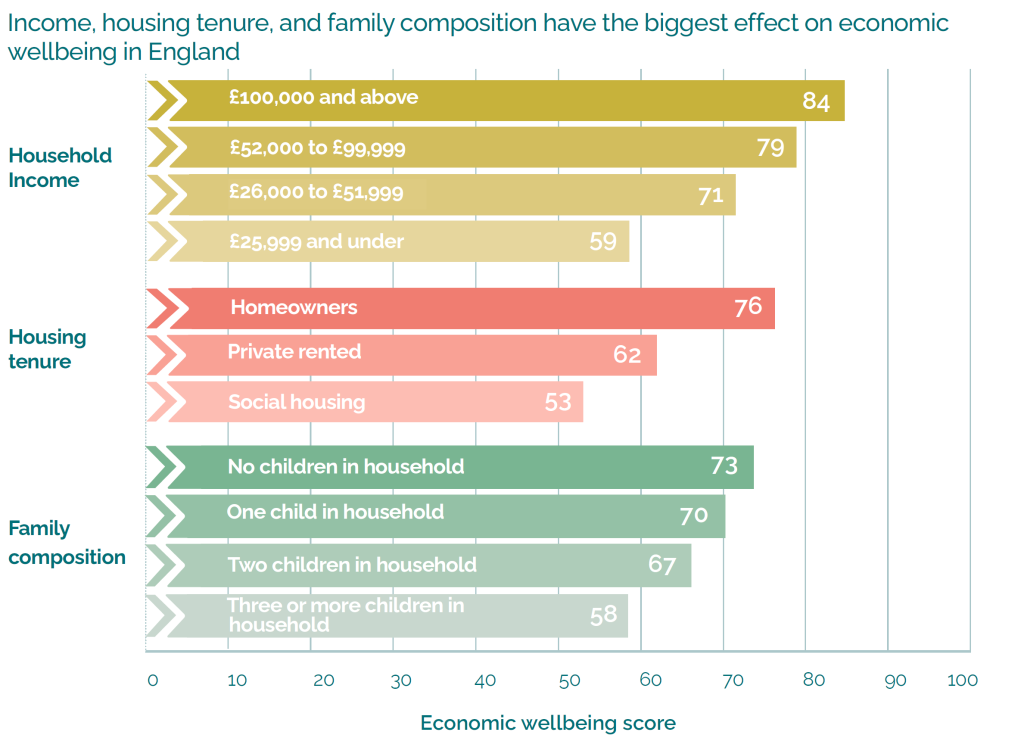
Economic wellbeing – standout statistics
More people can afford to keep their homes warm, but other areas of economic wellbeing have not improved and, in some cases, have deteriorated.
- 32% of people are dissatisfied with the availability of jobs in their local area, ten percentage points higher than in 2023.
- 21% of people cannot afford to pay for a week’s annual holiday away from home, unchanged on previous years.
- 13% of people cannot afford to keep their home adequately warm, an improvement of four percentage points since 2023.
Economic wellbeing summary
The economic wellbeing of people in England in 2025 remains 72 out of a possible 100. This has not changed since 2023, painting a picture of economic stagnation in terms of people’s reported financial lived experience.
People’s economic wellbeing is affected by a wide range of factors, most notably income, housing tenure, number of children in the household, and disability. Age, area deprivation and gender also continue to have a notable impact.
In 2025, more people agreed that they can afford to keep their home adequately warm than in 2024. There have been no other improvements to people’s ability to afford the things that enable them to thrive, like socialising with friends outside their home, or a week’s holiday away from home. Nor have there been changes to people’s economic resilience, measured by whether people could afford an unexpected but necessary bill of £850. The proportion dissatisfied with the availability of job opportunities in their local area has increased sharply. Overall, the picture is mixed.
Environmental wellbeing in England 2025
England scores 62 out of a possible 100 for environmental wellbeing.
Environmental wellbeing means that everyone has access to green and blue spaces and collectively we live within the planet’s natural resources, protecting the environment for future generations.
To determine trends in environmental wellbeing, we asked questions about access to and the quality of local parks, rivers and other green and blue spaces, and about noise pollution, air pollution, and litter in local areas. We also asked about levels of satisfaction with efforts to preserve the environment.
The people most likely to experience high environmental wellbeing in England in 2025 are:
- People who live in a rural area, who have an environmental wellbeing score of 71. This is 11 points higher than for those who live in urban areas.
- People over the age of 55, who have an environmental wellbeing score of 67. This is ten points higher than for those aged 16 to 34.
- People with a household income of over £100,000, who have an environmental wellbeing score of 65. This is six points higher than for those with a household income of below £26,000.
In contrast, the people who are likely to experience low environmental wellbeing in England in 2025 are:
- People who live in the most deprived areas, who have an environmental wellbeing score of 53. This is 16 points lower than for those who live in the least deprived areas.
- People who live in London, who have an environmental wellbeing score of 55. This is seven points lower than the average for England.
- Disabled people, who have an environmental wellbeing score of 58. This is five points lower than for people who are not disabled.
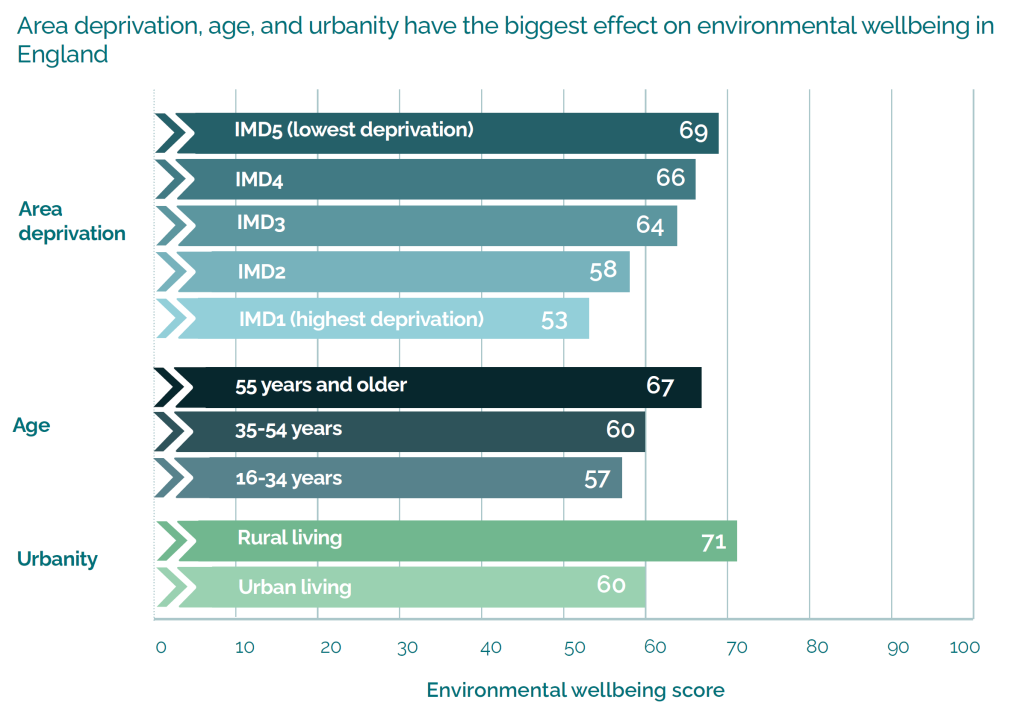
Environmental wellbeing –
standout statistics
More people are facing problems with their local environment, although fewer are dissatisfied with how much is being done to preserve the environment in the UK.
- 84% of people have problems with litter or rubbish on the street, three percentage points higher than in 2023.
- 66% of people experience problems with noise pollution, four percentage points higher than in 2023.
- 41% of people are dissatisfied with efforts to preserve the environment in the UK, though this is three percentage points lower than in 2023.
Environmental wellbeing summary
The environmental wellbeing of people in England has remained stable overall with a score of 62 out of a possible 100, no higher than in 2023. This score, like in previous years, varies widely according to factors such as where people live, whether someone is disabled, and their household income. Living in a rural area or in the least deprived areas continues to have a strong positive effect on environmental wellbeing.
Athough the result has improved over the years, two in five people in England remain dissatisfied with efforts being taken to preserve the environment. Combined with the widespread nature of environmental problems such as litter and noise pollution, this dissatisfaction suggests that people across England believe current environmental conditions are not good enough.
Taking care of our local environments has positive benefits beyond the domain of environmental wellbeing and can also improve things like our physical and mental health, and satisfaction with our communities, especially when improvements are made in partnership with local communities.
Democratic wellbeing in England 2025
England scores 42 out of a possible 100 for democratic wellbeing.
Democratic wellbeing is about everyone having a voice in decisions made that affect them. This means having local and national leaders who support participation, foster trust, and encourage diversity.
To understand democratic wellbeing, we asked questions about levels of trust in local, regional and national government(s), perceptions of personal ability to influence decisions.
Although England’s democratic wellbeing score has improved by one point in 2024, it is still chronically low for all, with some groups of people likely to have especially low democratic wellbeing.
The people most likely to experience higher democratic wellbeing in England in 2025 are:
- People with a household income of more than £100,000 per year, who have a democratic wellbeing score of 46. This is seven points higher than for people whose household income is below £26,000. Those whose household income is between £52,000 and £99,999 are also more likely to have higher democratic wellbeing, with a score of 44.
In contrast, the people who are likely to experience lower democratic wellbeing in England in 2025 are:
- People who live in the most deprived areas, who have a democratic wellbeing score of 38. This is seven points lower than for those who live in the least deprived areas.
- Disabled people, who have a democratic wellbeing score of 38. This is five points lower than for those without a disability.
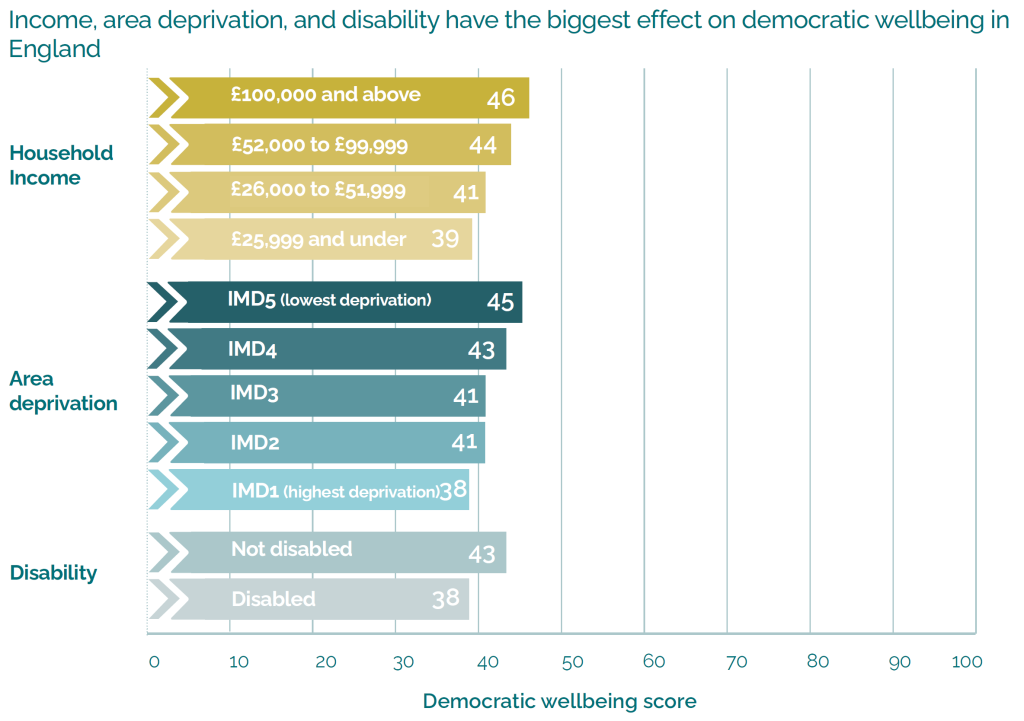
Democratic wellbeing – standout statistics
Trust in the UK Government has improved, but trust in some other institutions is falling and absolute trust remains low across the board.
- 43% of people in England have low trust in the UK Government, an improvement of nine percentage points since 2024 when over half (52%) had low trust. People in England are more likely to trust the UK Government than people in the other UK jurisdictions.
- 41% of people have low trust in big tech companies, six percentage points higher than in 2023.
- 28% of people have low trust in the local council for their area, three percentage points higher than in 2023.
- Only 7% of people feel that they can influence decisions that affect the UK, though this is one percentage point higher than in 2023.
Democratic wellbeing summary
The democratic wellbeing of people in England has improved slightly since 2024, by one point overall and is now 42 out of 100. This is largely because of increased trust in the UK Government, but also in institutions like banks and the news media.
Fewer factors correlate to high and low levels of democratic wellbeing than we see in the other three domains. This is largely because low democratic wellbeing is common across more groups: in other words, poor democratic wellbeing is universal. This should be of concern to policy makers.
There has been an improvement in trust in the UK Government since last year, with fewer people reporting low trust. This could be connected to the election of a new UK government in 2024. We will be interested to explore in future years if proximity to democratic events (e.g. general elections or local elections) consistently correlates with changes in aspects of people’s democratic wellbeing.
However, despite the overall improvement in trust in the UK Government, the percentage of people who feel that they can influence decisions affecting the UK remains unchanged since last year at just 7%.
Get in touch
Want to chat about Life in the UK 2025 England? Get in touch with Susan.
Help us make the case for wellbeing policy
Keep in touch with Carnegie UK’s research and activities. Learn more about ways to get involved with our work.
"*" indicates required fields

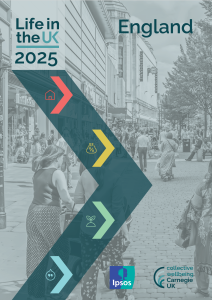
Social wellbeing in England 2025
England scores 72 out of a possible 100 for social wellbeing.